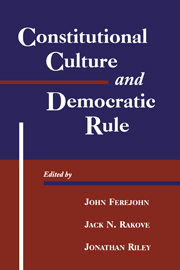Book contents
- Frontmatter
- Contents
- List of Contributors
- Editors' Introduction
- PART ONE CONSTITUTIONAL BEGINNINGS AND TRANSITIONS
- PART TWO CONSTITUTIONAL STRUCTURE AND DESIGN
- PART THREE CONSTITUTIONAL CHANGE AND STABILITY
- 8 Designing an Amendment Process
- 9 Constitutional Theory Transformed
- 10 Constitutional Economic Transition
- 11 Institutionalizing Constitutional Interpretation
- Name Index
- Subject Index
11 - Institutionalizing Constitutional Interpretation
Published online by Cambridge University Press: 20 March 2010
- Frontmatter
- Contents
- List of Contributors
- Editors' Introduction
- PART ONE CONSTITUTIONAL BEGINNINGS AND TRANSITIONS
- PART TWO CONSTITUTIONAL STRUCTURE AND DESIGN
- PART THREE CONSTITUTIONAL CHANGE AND STABILITY
- 8 Designing an Amendment Process
- 9 Constitutional Theory Transformed
- 10 Constitutional Economic Transition
- 11 Institutionalizing Constitutional Interpretation
- Name Index
- Subject Index
Summary
When a constituent assembly or other constitution-making body convenes in order to draft a constitution, the members of that assembly face a complex task. Their main goal is to agree on a constitution that will serve as the basis for a government for the present and, presumably, future generations. The constitution must establish a framework for the administration of government as well as enumerate the principles that will govern the relationship between the government and the citizenry. This is essentially a process of creating political institutions that will structure the behavior of the members of that society, a set of rules that will guide them toward a particular set of substantive political and economic goals.
In order to accomplish this task the members of such a body must come to the negotiations with some sense of which rules will best achieve their substantive goals. Because the rules will affect future outcomes, constitution makers want to create constitutional provisions that will produce the future outcomes they prefer given their expectations about the future conditions relevant to those outcomes. Thus, their preferences over constitutional provisions will be a function of their substantive preferences over future outcomes. But constitution making is a political process and these initial preferences must be modified by two primary concerns. First, they want to propose provisions that will achieve the assent of a sufficient number of additional constituent members to enact their proposals. In this politics of constitution making, they must take account of the compromises that must be made in order to garner the support of those who do not share their basic interests.
- Type
- Chapter
- Information
- Constitutional Culture and Democratic Rule , pp. 361 - 392Publisher: Cambridge University PressPrint publication year: 2001
- 1
- Cited by



